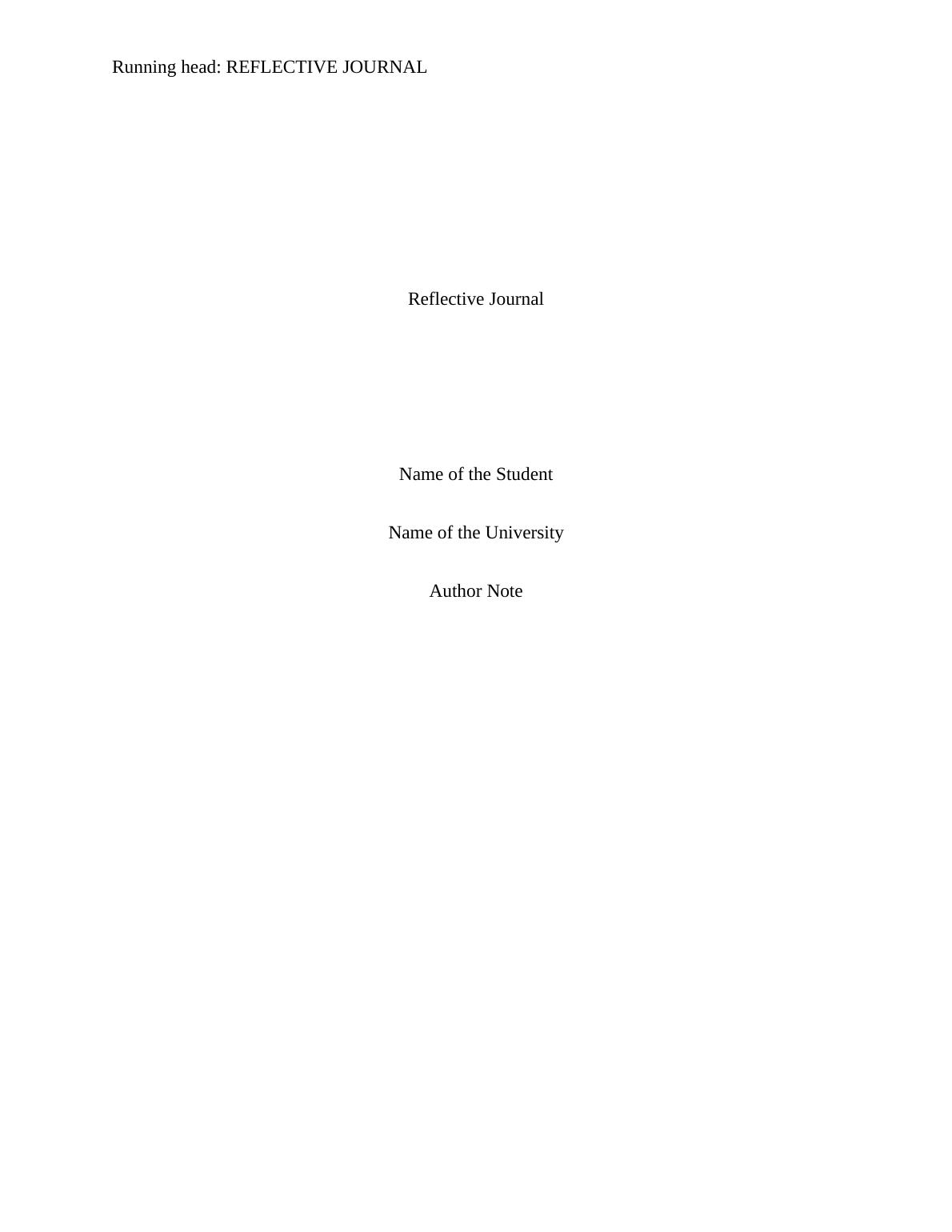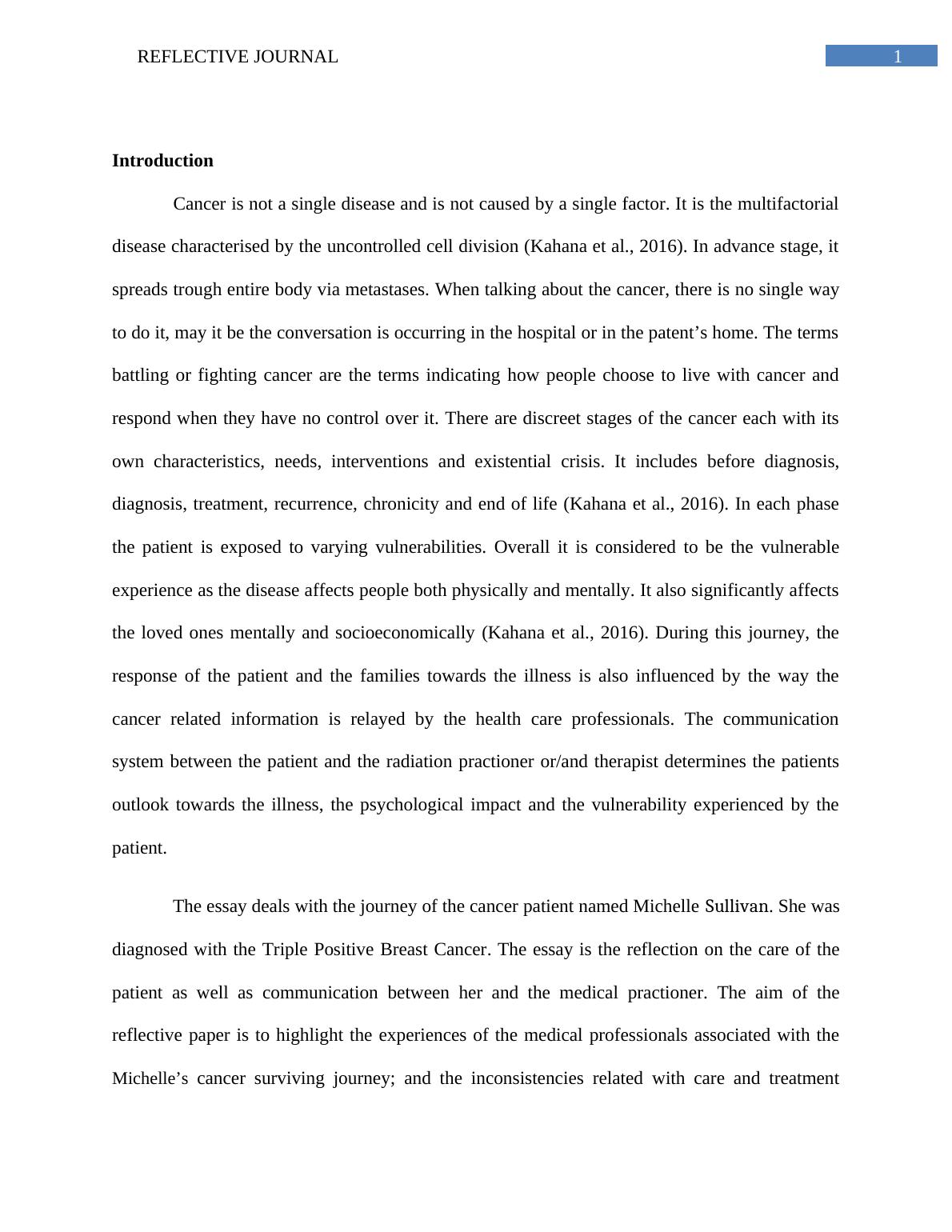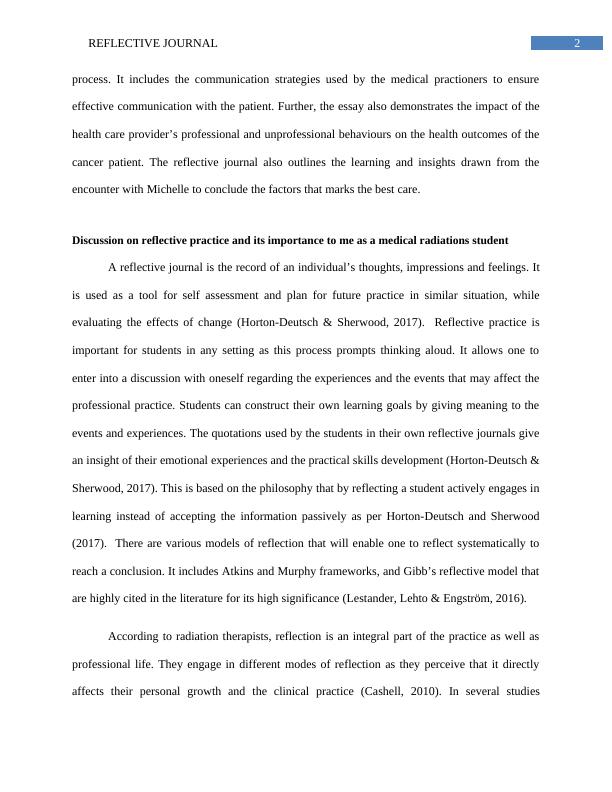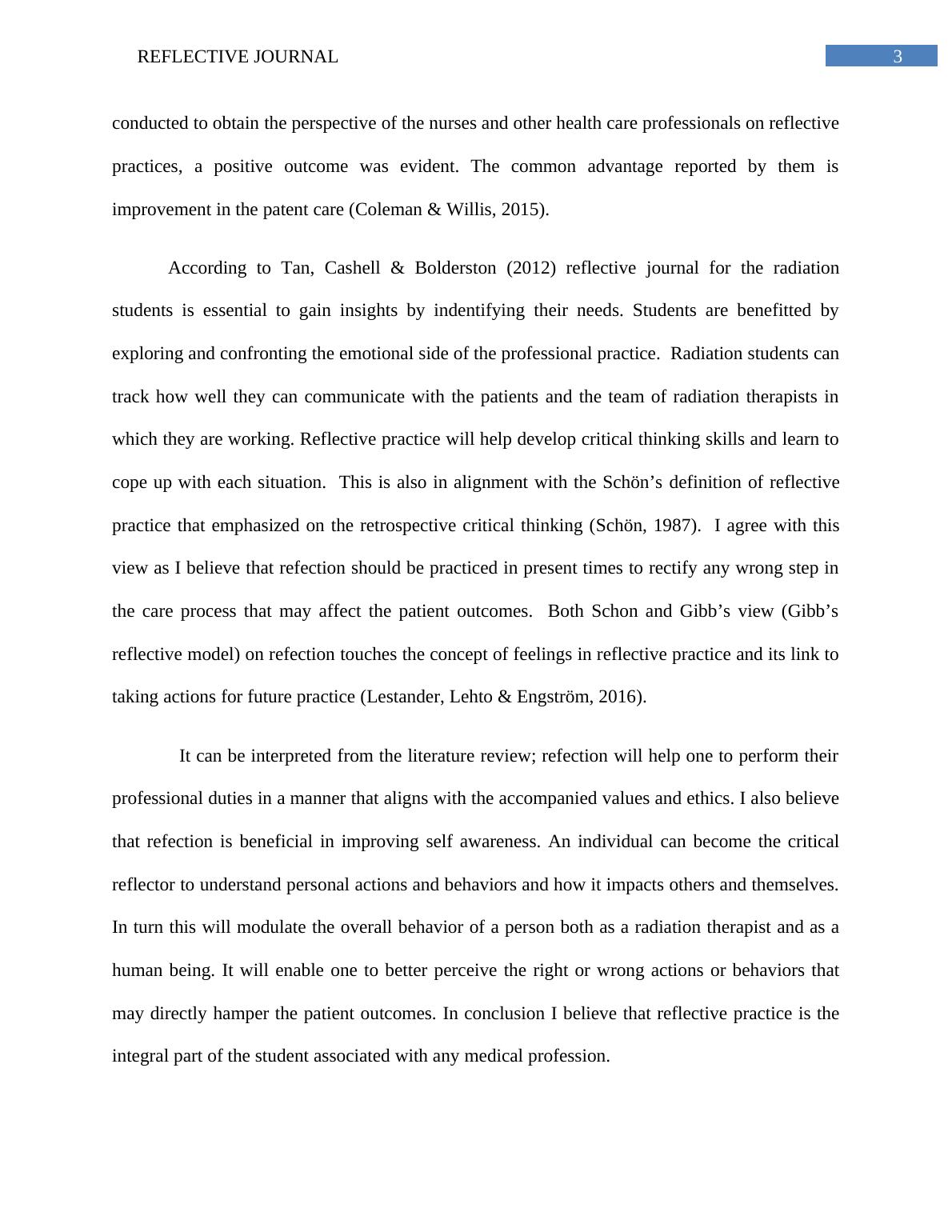Multifactorial Disease Characterised
Added on 2021-06-15
16 Pages4693 Words23 Views
Running head: REFLECTIVE JOURNALReflective JournalName of the StudentName of the UniversityAuthor Note

1REFLECTIVE JOURNALIntroduction Cancer is not a single disease and is not caused by a single factor. It is the multifactorialdisease characterised by the uncontrolled cell division (Kahana et al., 2016). In advance stage, itspreads trough entire body via metastases. When talking about the cancer, there is no single wayto do it, may it be the conversation is occurring in the hospital or in the patent’s home. The termsbattling or fighting cancer are the terms indicating how people choose to live with cancer andrespond when they have no control over it. There are discreet stages of the cancer each with itsown characteristics, needs, interventions and existential crisis. It includes before diagnosis,diagnosis, treatment, recurrence, chronicity and end of life (Kahana et al., 2016). In each phasethe patient is exposed to varying vulnerabilities. Overall it is considered to be the vulnerableexperience as the disease affects people both physically and mentally. It also significantly affectsthe loved ones mentally and socioeconomically (Kahana et al., 2016). During this journey, theresponse of the patient and the families towards the illness is also influenced by the way thecancer related information is relayed by the health care professionals. The communicationsystem between the patient and the radiation practioner or/and therapist determines the patientsoutlook towards the illness, the psychological impact and the vulnerability experienced by thepatient. The essay deals with the journey of the cancer patient named Michelle Sullivan. She wasdiagnosed with the Triple Positive Breast Cancer.The essay is the reflection on the care of thepatient as well as communication between her and the medical practioner. The aim of thereflective paper is to highlight the experiences of the medical professionals associated with theMichelle’s cancer surviving journey; and the inconsistencies related with care and treatment

2REFLECTIVE JOURNALprocess. It includes the communication strategies used by the medical practioners to ensureeffective communication with the patient. Further, the essay also demonstrates the impact of thehealth care provider’s professional and unprofessional behaviours on the health outcomes of thecancer patient. The reflective journal also outlines the learning and insights drawn from theencounter with Michelle to conclude the factors that marks the best care. Discussion on reflective practice and its importance to me as a medical radiations student A reflective journal is the record of an individual’s thoughts, impressions and feelings. Itis used as a tool for self assessment and plan for future practice in similar situation, whileevaluating the effects of change (Horton-Deutsch & Sherwood, 2017). Reflective practice isimportant for students in any setting as this process prompts thinking aloud. It allows one toenter into a discussion with oneself regarding the experiences and the events that may affect theprofessional practice. Students can construct their own learning goals by giving meaning to theevents and experiences. The quotations used by the students in their own reflective journals givean insight of their emotional experiences and the practical skills development (Horton-Deutsch &Sherwood, 2017). This is based on the philosophy that by reflecting a student actively engages inlearning instead of accepting the information passively as per Horton-Deutsch and Sherwood(2017). There are various models of reflection that will enable one to reflect systematically toreach a conclusion. It includes Atkins and Murphy frameworks, and Gibb’s reflective model thatare highly cited in the literature for its high significance (Lestander, Lehto & Engström, 2016). According to radiation therapists, reflection is an integral part of the practice as well asprofessional life. They engage in different modes of reflection as they perceive that it directlyaffects their personal growth and the clinical practice (Cashell, 2010). In several studies

3REFLECTIVE JOURNALconducted to obtain the perspective of the nurses and other health care professionals on reflectivepractices, a positive outcome was evident. The common advantage reported by them isimprovement in the patent care (Coleman & Willis, 2015). According to Tan, Cashell & Bolderston (2012) reflective journal for the radiationstudents is essential to gain insights by indentifying their needs. Students are benefitted byexploring and confronting the emotional side of the professional practice. Radiation students cantrack how well they can communicate with the patients and the team of radiation therapists inwhich they are working. Reflective practice will help develop critical thinking skills and learn tocope up with each situation. This is also in alignment with the Schön’s definition of reflectivepractice that emphasized on the retrospective critical thinking (Schön, 1987). I agree with thisview as I believe that refection should be practiced in present times to rectify any wrong step inthe care process that may affect the patient outcomes. Both Schon and Gibb’s view (Gibb’sreflective model) on refection touches the concept of feelings in reflective practice and its link totaking actions for future practice (Lestander, Lehto & Engström, 2016). It can be interpreted from the literature review; refection will help one to perform theirprofessional duties in a manner that aligns with the accompanied values and ethics. I also believethat refection is beneficial in improving self awareness. An individual can become the criticalreflector to understand personal actions and behaviors and how it impacts others and themselves.In turn this will modulate the overall behavior of a person both as a radiation therapist and as ahuman being. It will enable one to better perceive the right or wrong actions or behaviors thatmay directly hamper the patient outcomes. In conclusion I believe that reflective practice is theintegral part of the student associated with any medical profession.

End of preview
Want to access all the pages? Upload your documents or become a member.
Related Documents
Case Study on Palliative Carelg...
|4
|803
|492
Reflective Assignment 2022lg...
|5
|1130
|12
Improving Patient Journey and Provider Experience in Breast Cancer Carelg...
|24
|7115
|494
Chronic Illness Management: Barriers, Support System, and Role of Healthcare Teamlg...
|6
|1371
|192
Bachelor of nursing - Assignmentlg...
|9
|2297
|212
Mental Well-beingness in Medical Settinglg...
|5
|859
|256